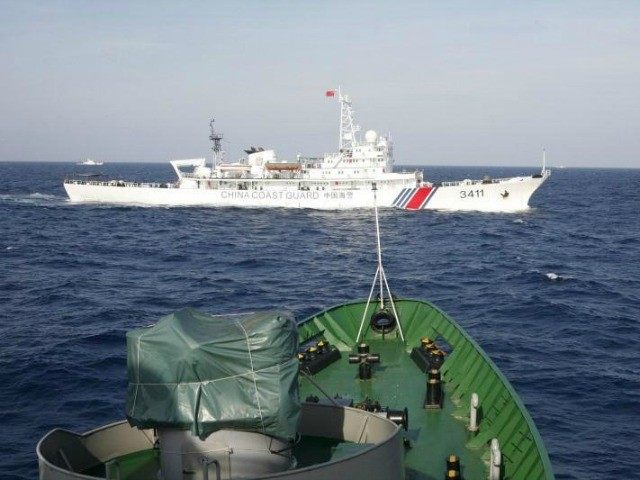Vietnamese officials have seized a Chinese ship and arrested its crew after it wandered into Vietnamese waters in the South China Sea, the latest in a string of similar seizures of trespassing Chinese ships around the globe. In addition to not being able to justify their presence in Vietnam, the Qiong Yangpu’s crew refused to identify the origin of their cargo: 100,000 liters of diesel fuel.
Authorities detained the ship’s crew in the Gulf of Tonkin, outside the scope of China’s South China Sea claims that overlap with Vietnamese territory. The captain of the ship reportedly admitted to being present in the waters illegally and claimed that his cargo was intended to refuel ships navigating in the area. The ship reportedly lacked any work permits to conduct its business.
Vietnam’s An Ninh Thủ Dô newspaper reports the ships the Qiong Yangpu claims it was in the region to serve were also present in Vietnamese waters illegally. Vietnam’s state news agency reported that “the captain of the vessel admitted the oil was to be sold to other Chinese boats which were fishing illegally in Vietnam’s waters.” The oil aboard the ship, meanwhile, remains “without clear origin,” leading some to question whether the ship’s crew was operating outside of the margins of Chinese law or acquired the oil through connections in Beijing.
Singapore’s Straits Times describe the arrests as a “rare move” on Vietnam’s part, as tensions between the two communist neighbors have run high for years since China imposed its “nine-dash line” border, usurping much of the South China Sea. China’s claims as presented by the nine-dash line overlap with those of Vietnam, the Philippines, Malaysia, Brunei, and Taiwan, and have alarmed countries with claims close to, but not overlapping, with China’s, such as Indonesia.
Vietnam claims parts of the highly contested Spratly and Paracel Islands where, two years ago, China began constructing a variety of research, surveillance, and military facilities. The Chinese government has imposed its claims in the region by sending its coast guard to keep Vietnamese and Filipino ships out of relevant areas both nations claim fall within their exclusive economic zones. The Chinese Coast Guard has, on multiple occasions, attacked Vietnamese fishing ships operating in the Paracel Islands, on some occasions sinking them. In October 2015, the head of the Quang Ngai regional Fisheries Association, Phan Huy Hoang, described China as becoming “more aggressive and brutal” towards Vietnamese fishermen in recent memory.
China’s actions towards Vietnam have turned public opinion against what was once considered a trustworthy ally, and the typically repressive Vietnamese government has allowed displays of discontent and protests against China’s intrusions in the region. It has also begun investing heavily in its military. In January, Vietnamese officials announced it would begin deploying its recently purchased fleet of Kilo-class submarines in the region. Vietnam’s military bought six of these models from Russia in the past two years.
The arrest of the Qiong Yangpu crew is the latest such story regarding foreign governments detaining Chinese ships illegally present in their waters. At least three similar incident involving three different states occurred in March. The government of Indonesia arrested the crew of a trespassing Chinese ship and seized the vessel, but was forced to release the ship after Chinese Coast Guard boats began ramming it, forcing the Indonesian officials to choose between freeing the ship or letting it – and all the evidence aboard – sink. The government of Argentina sunk a Chinese ship illegally present in the South American nation’s waters last month after it began attacking Argentine Coast Guard vessels. The government of Taiwan, which China does not recognize as a state independent of China, also arrested the crew of a Chinese ship illegally present in its waters.
Chinese state media appear not to have responded yet to the Qiong Yangpu incident; Monday is a public holiday in China. State news outlet Xinhua has, instead, published an editorial condemning the government of the Philippines for participating in a joint military exercise with the United States this week. The joint military exercise will be held near the nine-dash line border and will feature 10,000 soldiers, 8500 of them American. In addition to the joint forces, between 80-95 Australian troops are expected to observe, and Japan has sent two destroyers and a submarine to join the coalition, with a total of about 500 Japanese troops involved.
“A provocation so fear-mongering and untimely as such is likely to boomerang on the initiators,” a scathing column in Xinhua warns the coalition, describing Filipino officials’ assertions that China is not the target of the exercise as a “malicious misrepresentation” and warned that such exercises “have fanned fears and disturbed the tranquility of the South China Sea.”

COMMENTS
Please let us know if you're having issues with commenting.